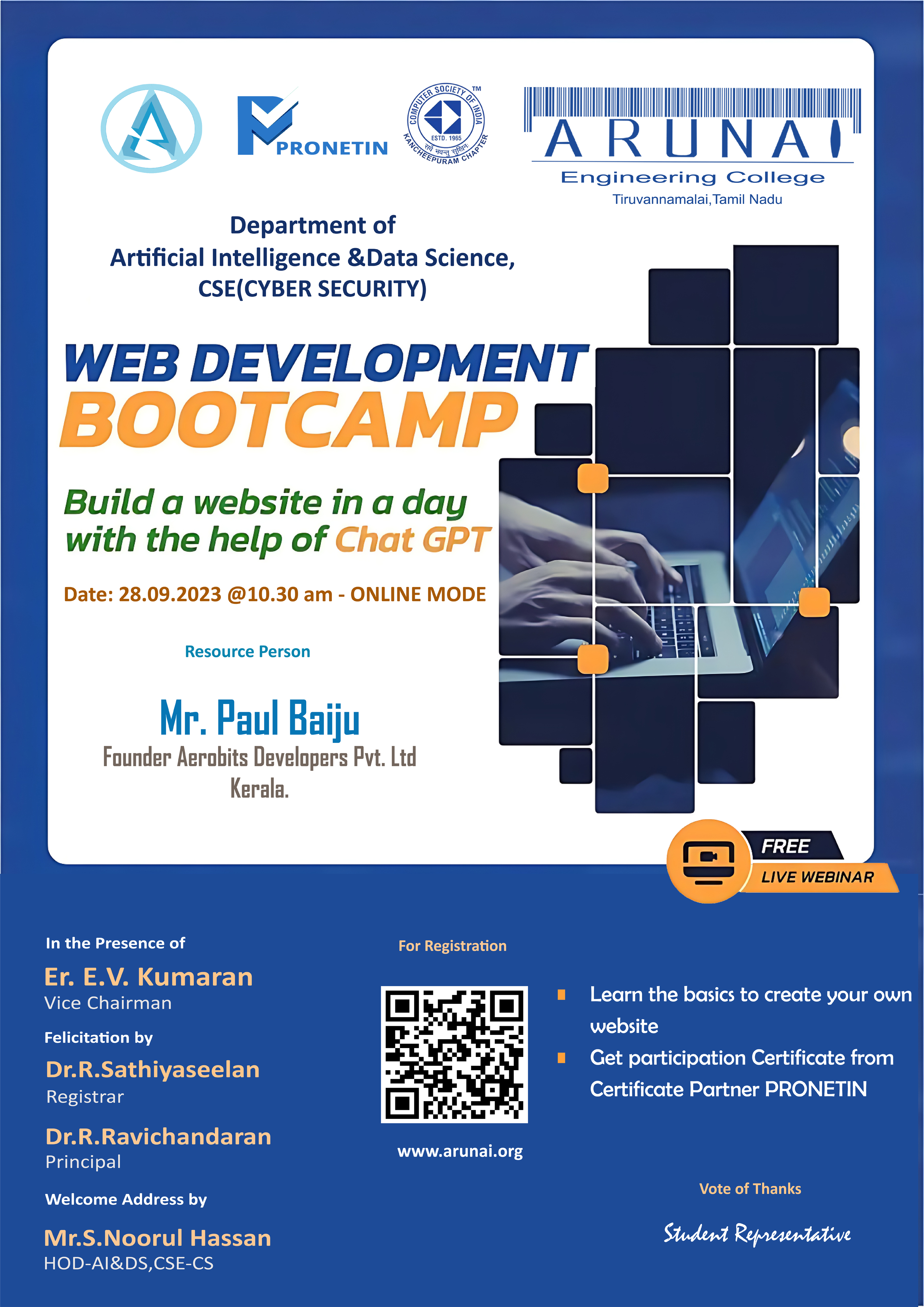
B.E- CSE (CYBER SECURITY)
Academics
The Department of Computer Science and Engineering-CYber Security was established in the year 2022 .The current intake students are 60 for UG Programme. UG Programmes are conducted based on the syllabus prescribed by the Anna University, Chennai. The department is equipped with well qualified and experienced faculty members to improve and enhance the knowledge of the student community. The department has good computing facilities with latest and updated versions of the software. The department conduct periodic workshop, seminar and conferences to help students, research scholars and industries to share a common platform and thereby strengthen the industry institution fusion
Faculty
The department has highly qualified faculty with a blend of academic experience. The faculty helps the students to present papers in different Seminars, Symposium and also encourage the students for these activities.
To provide every student with a strong conceptual foundation in the core areas of Computer Science
To coach students to work in teams and provide insight and direction into the program which imparts an outstanding educational opportunity for those planning to pursue a career or to gain in-depth knowledge in computing technology and research, current trends, developments and analysis.
To become a centre of global excellence with the state of art technology by producing qualified Trained Engineers with the latest security handling Technology .
• To impart knowledge as per present industrial requirements and prepare them for better employment.
• Collaborate with innovators to provide real-world, standards-based cyber security capabilities that address business needs.
• Prepare the professionals in both academic research and industrial settings capable of solving real-world cyber security threats.
Program Educational Objectives (PEO)
PEO1 : Apply their technical competence in computer science to solve real world problems, with technical and people leadership.
PEO2 : Conduct cutting edge research and develop solutions on problems of social relevance
PEO3 : Work in a business environment, exhibiting team skills, work ethics, adaptability and lifelong learning
Program Outcomes (POs)
PO1 - Engineering Knowledge: Apply the knowledge of mathematics, science, engineering fundamentals and an engineering specialization to the solution of complex engineering problems.
PO2 - Problem Analysis: Identify, formulate, review research literature, and analyze complex engineering problems reaching substantiated conclusions using first principles of mathematics, natural sciences, and engineering sciences.
PO3 - Design / Development of solutions: Design solutions for complex engineering problems and design system components or processes that meet the specified needs with appropriate consideration for the public health and safety, and the cultural, societal, and environmental considerations.
PO4 - Conduct investigations of complex problems: Use research-based knowledge and research methods including design of experiments, analysis and interpretation of data, and synthesis of the information to provide valid conclusions.
PO5 - Modern tool usage: Create, select, and apply appropriate techniques, resources, and modern engineering and IT tools including prediction and modeling to complex engineering activities with an understanding of the limitations.
PO6 - The engineer and society: Apply reasoning informed by the contextual knowledge to assess societal, health, safety, legal and cultural issues and the consequent responsibilities relevant to the professional engineering practice.
PO7 - Environment and sustainability: Understand the impact of the professional engineering solutions in societal and environmental contexts, and demonstrate the knowledge of, and need for sustainable development.
PO8 - Ethics: Apply ethical principles and commit to professional ethics and responsibilities and norms of the engineering practice.
PO9 - Individual and team work: Function effectively as an individual and as a member or leader in diverse teams, and in multidisciplinary settings.
PO10 - Communication: Communicate effectively on complex engineering activities with the engineering community and with society at large, such as, being able to comprehend and write effective reports and design documentation, make effective presentations, and give and receive clear instructions.
PO11 - Project management and finance: Demonstrate knowledge and understanding of the engineering management principles and apply these to one’s own work, as a member and leader in a team, to manage projects and in multidisciplinary environments.
PO12 - Life-long learning: Recognize the need for and have the preparation and ability to engage in independent and lifelong learning in the broadest context of technological change.
Program Specific Outcomes (PSOs)
PSO1 : Exhibit design and programming skills to build and automate business solutions using cutting edge technologies
PSO2 : Strong theoretical foundation leading to excellence and excitement towards research, to provide elegant solutions to complex problems.






